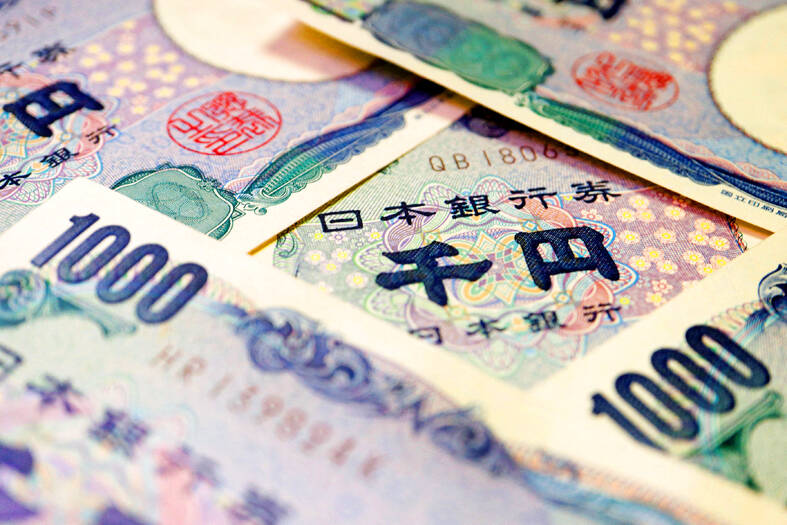Japan is open to intervening in the currency market “to mitigate the side effects of a weak yen,” a Japanese government panel member said, reflecting Japanese Prime Minister Sanae Takaichi’s concerns about inflation.
Takaichi’s administration “will intervene more actively in the foreign exchange market, I believe,” Takuji Aida, who is also chief economist at Credit Agricole SA, said yesterday during a live broadcast on NHK.
He added that the nation has more than enough foreign exchange reserves, as Japan’s economic situation is not dire.

Photo: Reuters
Aida’s comments echo remarks he made last week warning traders that currency intervention could come sooner than many expect. The threshold of 160 to the US dollar is seen as a line in the sand after authorities bought the yen on several occasions last year after it weakened past that level.
Aida on Thursday said that Japanese authorities could step into the market before the yen reaches that level, if currency moves “become sharp.”
After weakening last week to a 10-month low that took it past 157 to the US dollar, Japan’s currency drifted a tad higher to about 156.40 as of yesterday in Tokyo, just days after Takaichi unveiled the nation’s biggest fiscal stimulus package since the COVID-19 pandemic.
The stimulus plan would feature ¥17.7 trillion (US$113 billion) in general account spending, the Japanese Cabinet Office said on Friday — representing a clear jump from last year that would be reflected in an upcoming extra budget. The total package is valued at ¥21.3 trillion, with the bulk of the measures aimed at price relief.
“We’ve put together this package to protect livelihoods, and particularly to respond quickly to the problem of inflation,” Takaichi said after the details of the measures were released.
Last week’s moves prompted an escalation in verbal intervention from Japanese authorities, with Japanese Minister of Finance Satsuki Katayama saying on Friday that authorities would respond appropriately to excessive currency moves, and that currency intervention is an option.
Speculation that Takaichi, known to support reflationist policies, might discourage the Bank of Japan (BOJ) from a near-term rate hike has helped weigh on the currency since she became prime minister last month. While Aida is also a reflationist, his comments as a member of the prime minister’s advisory panel reflect the administration’s concern that a weak currency could spur inflationary pressure.
The BOJ is to next set policy on Dec. 19. BOJ Governor Kazuo Ueda met with Takaichi last week. He said he explained that the central bank is in the process of rolling back the degree of policy easing undertaken by his predecessor, and she understood that description.
Aida also said yesterday it is important to invest in artificial intelligence, naval frigates, defense and other sectors even if Japan needs to issue bond to do so.
The new administration would look to balance steady economic growth with efforts to balance inflation, he added.

In Italy’s storied gold-making hubs, jewelers are reworking their designs to trim gold content as they race to blunt the effect of record prices and appeal to shoppers watching their budgets. Gold prices hit a record high on Thursday, surging near US$5,600 an ounce, more than double a year ago as geopolitical concerns and jitters over trade pushed investors toward the safe-haven asset. The rally is putting undue pressure on small artisans as they face mounting demands from customers, including international brands, to produce cheaper items, from signature pieces to wedding rings, according to interviews with four independent jewelers in Italy’s main

Japanese Prime Minister Sanae Takaichi has talked up the benefits of a weaker yen in a campaign speech, adopting a tone at odds with her finance ministry, which has refused to rule out any options to counter excessive foreign exchange volatility. Takaichi later softened her stance, saying she did not have a preference for the yen’s direction. “People say the weak yen is bad right now, but for export industries, it’s a major opportunity,” Takaichi said on Saturday at a rally for Liberal Democratic Party candidate Daishiro Yamagiwa in Kanagawa Prefecture ahead of a snap election on Sunday. “Whether it’s selling food or

CONCERNS: Tech companies investing in AI businesses that purchase their products have raised questions among investors that they are artificially propping up demand Nvidia Corp chief executive officer Jensen Huang (黃仁勳) on Saturday said that the company would be participating in OpenAI’s latest funding round, describing it as potentially “the largest investment we’ve ever made.” “We will invest a great deal of money,” Huang told reporters while visiting Taipei. “I believe in OpenAI. The work that they do is incredible. They’re one of the most consequential companies of our time.” Huang did not say exactly how much Nvidia might contribute, but described the investment as “huge.” “Let Sam announce how much he’s going to raise — it’s for him to decide,” Huang said, referring to OpenAI

The global server market is expected to grow 12.8 percent annually this year, with artificial intelligence (AI) servers projected to account for 16.5 percent, driven by continued investment in AI infrastructure by major cloud service providers (CSPs), market researcher TrendForce Corp (集邦科技) said yesterday. Global AI server shipments this year are expected to increase 28 percent year-on-year to more than 2.7 million units, driven by sustained demand from CSPs and government sovereign cloud projects, TrendForce analyst Frank Kung (龔明德) told the Taipei Times. Demand for GPU-based AI servers, including Nvidia Corp’s GB and Vera Rubin rack systems, is expected to remain high,